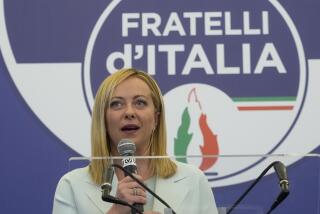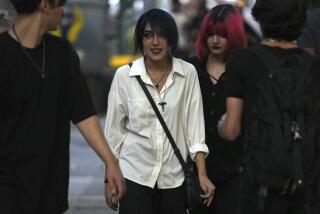Italian Mayor Sees Veiled Threat
- Share via
ROME — Cristian Tolettini, mayor of the tiny northern Italian town of Drezzo, is merely enforcing the law, as far as he is concerned -- a Fascist-era law still on the books that forbids people to use masks or garments to conceal their identity in public.
The object of Tolettini’s legal exactitude is Sabrina Varroni, a 34-year-old mother of four and convert to Islam who insists on wearing a burka -- a full veil and head-to-toe cloak -- for religious reasons.
“We don’t have problems with Muslims,” Tolettini said Tuesday in a telephone interview from Drezzo. “I only ask that my citizens respect the law, that’s all.” That’s especially true, he said, in this time of international terrorism.
So Tolettini has ordered that Varroni, an Italian married to a Moroccan, be fined every time she appears in public in the burka. So far, Drezzo’s lone police officer has caught her twice and issued tickets for 41 euros, or about $50, a pop.
Varroni is refusing to pay the fines and has hired a lawyer to mount a legal case. She could not be reached Tuesday but she earlier told Italian newspapers that she felt that she was being persecuted.
The burka ban is the latest twist in Italy’s efforts to respond to its growing Muslim population. It echoes the controversy in France over a ban on religious dress and symbols in public schools that went into effect this month.
Italian authorities say they are trying to balance cultural tolerance with the need to integrate immigrant communities. The debate erupted most furiously in Italy last year when a Muslim father sued to have the Christian crucifix removed from public schoolrooms.
Tolettini is a member of the Northern League, a conservative party that forms part of the ruling coalition of Prime Minister Silvio Berlusconi. The Northern League frequently has adopted positions seen as anti-immigrant and anti-Muslim.
The mayor has received enthusiastic support from other members of his party and condemnation from center-left opposition leaders, who say the burka ban is racist and only exacerbates cultural tensions.
“It is an ignoble act of persecution,” Gianfranco Pagliarulo of the Communist Party told reporters.
This is the second Northern League town this year to use the 1931 law as a way to prohibit veils.
And it may be just the beginning. Matteo Salvini, who represents the Northern League in the European Parliament, said he hoped to expand the ban to Milan, Italy’s financial center and second-largest city. So many Muslims wearing veils or other restrictive garments live in Milan, he said, that parts of the city are starting “to look like Kabul.”
“If I go to a mosque, I take off my shoes because I respect their laws,” Salvini said in a telephone interview from Brussels, where the European Parliament holds session. “I’m asking them, with other traditions, to respect our laws. It’s that simple. The problem is they don’t want to mix with Italians. They want to stay apart. There is no integration.”
Given the fact that a number of suspected terror cells have been traced to Milan and other parts of Italy, it would be foolhardy to allow people to move in public in “disguise,” Salvini and other Northern League politicians say.
In Drezzo, population 1,000, Tolettini said the town’s 10 Muslims were perfectly integrated, except for Varroni.
“She is the only one wearing a burka in town, but imagine if we had four or five,” he said. “Public security would be a problem.”
Varroni told the Italian media she has always been willing to identify herself to female city authorities whenever necessary.
“The veil is a rule that I want to respect as part of my religion,” she said. “Is there a law which forbids it? Let’s see what a judge says.”
At least one of Italy’s Muslim leaders said he was not too bothered by the actions of Northern League officials in Drezzo and elsewhere because they represent a minority.
“The majority of Italians are very tolerant,” said Abdul Hameed Alshaari, president of the Islamic Cultural Institute of Milan. “Italy itself has immigrants all over the world. They know what it means to be an immigrant and they know what tolerance means.”
*
Maria De Cristofaro in The Times’ Rome Bureau contributed to this report.
More to Read
Sign up for Essential California
The most important California stories and recommendations in your inbox every morning.
You may occasionally receive promotional content from the Los Angeles Times.














